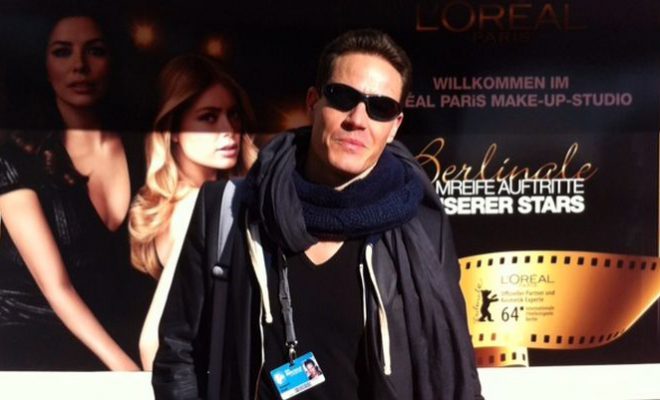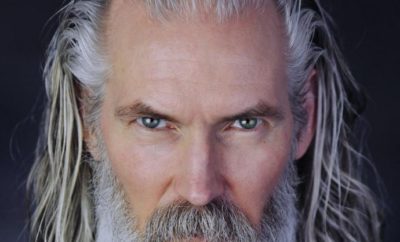
Interviews
Howard J. Ford – Never Let Go
By: Ruth Hill
Howard J Ford, director and writer of the feature Never Let Go, which will make its U.S. premiere at the Artemis Film Festival this year in Los Angeles. He has directed five feature films, including a number one hit in the US in 2012 with The Dead and 200+ TV commercials. This latest feature film Never Let Go has recently won Best Independent Film at the prestigious National Film awards. Recently, Howard took some time to chat with me about and give some amazing insight into what is possibly going to be one of the most amazing indie films of 2016.
How did you get started in the entertainment industry?
I kind of feel like I am a reincarnated filmmaker. I’ve wanted to make films since I was about ten years old. I have no idea why. I made my first short film when I was thirteen years old. My brother and I went out shooting with 8mm film and we made short films together. Sometimes I would act in them, but we just enjoyed doing it. Oh they were terrible–I would never want to show them to anyone.
I never went to film school and I was never taught how to make films. I’m completely free and I made my own rules. I don’t have someone over my shoulder saying, “You should have done it this way.” I enjoy the freedom that brings.
I made around seven short films and one finally won some prestigious awards at various festivals. So after receiving those awards, we gained the confidence to approach investors for money. And then I directed my first feature film when I was twenty-one years old.
I want to see as much of the world as I can before I die, and that is one reason I am in this business. In this business, you need also need three things–talent, determination and luck. When I teach at the film school, I always tell the students that. There is no right or wrong way to do it. There are a million reasons not to get in and really only a few reasons to get into the business. It is the same thing with acting. You can have two of those three and it still isn’t going to happen. You have to have all three for lightning to strike. The most important thing is treating people with respect – not being arrogant or egotistical. Be grateful for the opportunities you do have and with all that we have in this Western world, we should be grateful for that. However frustrated I get with what doesn’t go right, I am very privileged to be in this world and to be able to tell my stories. As much as I would like to get my movie on a massive theatrical release, we are very lucky to be in this business.
What inspired you to write Never Let Go?
It just so happens that some time ago, I nearly lost my son. I was in Yorkshire on vacation and my son, Felix, had just turned three years old. I was by the pool and I had been sunburned. My son wanted to go swimming, but I didn’t want to. So, I sat back under the shade and he went off to the pool, floating on a lilo (inflatable mattress). I happened to have a text message on my phone and I was replying to the text–you should never do that–and I looked up and he was gone! The lilo is floating in the pool and he’s not there. So, I started calling out, “Felix! Felix, where are you?” I was looking this way and that. It was really a nightmare for me. I thought he may have been abducted–maybe bundled into the back of a car. I was ready to go into fighting mode and do things I wouldn’t normally do to get him back. I told myself I had to get a grip since I was shaking and my adrenaline was going. I thought maybe he was at the other pool just a little ways away. So, I ran down that way. I moved towards the edge of the pool and he was at the bottom! It looked like he had drowned. His arms were flailing so I figured he was close to drowning at least. I quickly pulled him out–I thought I was pulling his body out. I shook him and he vomited on me, which was a fantastic moment [laughs] and he was okay. For those moments when I thought I had lost him–probably not more than two and a half minutes–felt like forever. I was gripped by this dread and fear–I was terrified. I’m only a father, I’m not a mother–I hadn’t carried this child in my stomach for nine months. I was so terrified and then so relieved that I got him back. It had been just the most awful, sickening feeling ever.
As a result of this, where does my energy go? I thought, “Why have I not seen a film where for an hour and a half this thing that I went through plays out for a mother who has all these motherly instincts–all of her inner and outer strengths on display?” In a way, the film is almost more about inner than outer strengths. I was writing other films at the time, but I set those aside because I couldn’t write anything else. Straight after the instance, the plot of Never Let Go just came out of me. I couldn’t stop it. I embellished it with twists and turns, I hope. I tried my best. And I basically went out and shot the film. We chose Morocco as the place to film because it was just so beautiful and peaceful. The incredible locations it has. It just had to be done there. And that’s how the film got going.
What kind of research/preparation did you do for the film?
Your child turning up missing is a parent’s worst nightmare. And it can happen anywhere. The shopping mall or any place–it can happen in 20 seconds–that moment when you see a parent looking around and there are crowds of people walking by this big, empty void opens up inside you. It’s one of the most terrible things that a parent should not have to even imagine.
When I sat down to write the film, I started to research into missing children, abducted children and children who might be sold on the black market–horrible thing to look into but a world I needed to know about. I started to come up with some awful statistics about how many children go missing. A child goes missing every couple of seconds. In the time we have been talking, maybe 50 children have gone missing. Obviously, a big percentage of those will be found. There’s a thing called the three-hour window which basically means that if your child is not found in the first three hours, less than 25 percent are ever seen again. Now they have Amber Alerts in the States, which certainly helps, but it is an alarming figure. Such a horrible thought, but I put those statistics up on the beginning of the film.
While the film story itself is fictitious, everything that I have put in the film (i.e. statistics) are real and true. All the statistics and even some of the situations are based on real events that I discovered during my research. Yes, as a filmmaker, I did embellish the plot so I could make it as dramatic as I could. I did take some liberties because I wanted to entertain the people. But all the things that happen in the film at least come from a point of truth, either I felt is as a writer from the experience I had or from the research. I’m hoping that people who are watching the film, whether they like it or not, get an honest look into this world and what could happen in a situation like that.
Incidentally, my son Felix is alive and well (and I hope shall remain so) is in the opening scene of the movie. He’s one of the children who gets taken at the beginning of the film.
What can you tell us about the cast/filming?
Working with the cast was great, but it was very difficult to get this film made. The locations are fantastic. We got to film in places that they hadn’t filmed in decades or some locations where films may never have been made. You will see some locations in the film that you won’t get in other movies. I hope it is a visual journey, too.
The main actress is a lovely person who truly put her heart and soul into every part of this film. Originally, we had a very well-known American star–can’t say who–but I think her agent didn’t believe she would be safe in Morocco. But I think it was all meant to be because Angela Dixon is just amazing in her role.
When it comes to casting and all the behind-the-scenes stuff for the film, it is extremely important to me that I work with people who are nice and down-to-earth and never arrogant or egotistical. Honestly, I am just as grateful to the person who sweeps the floor as the person who invests in the film. I will not treat the people any differently. Both deserve respect, but no one deserves to be treated better nor worse than the other. I would like to think that people know me for that as well as my filmmaking.
Why are you so passionate about women’s action films?
There is a huge lack of films about women that feature a female protagonist. About 50 percent of the population are women and statistics from a couple years ago state that only about twelve percent of movies are predominately female-led. And that is just not right! Women are fabulous, so why are we not using them in lead roles more? Since I had been feeling that anyway, I wanted to take the opportunity to make a film that is more a celebration of the sisterhood of women and about women’s strengths as well as their difficulties and challenges. So, I hope people seeing the film will see it as more than just an action film because there is more than just action. Hopefully, people will see the mental struggle and I hope that the messages come across that shows all the garbage that women have to deal with sometimes.
How did you get involved with the Artemis Film Festival?
It’s odd because it came to me by several sources. Angela had heard of the festival already and we thought it sounded just perfect. And a friend in the film industry sent me a link saying that the Artemis Film Festival was looking for films that were female action-driven films. My friend thought it sounded perfect for my film and I agreed.
We just had the film at Frightfest in London, which is genre-based and my brother and I are known for horror flicks and that genre. Although Never Let Go is not a horror film, we showed it in London and got some great reviews for that. And we were looking for a place to have our American debut and this looked perfect. So, I found an email address and it just seemed like a perfect fit. Needless to say, I stopped looking for another American venue to premiere in the U.S. because this seems like such a perfect fit. It is a lovely theater and I’m looking forward to the event.
Any other works upcoming you can mention?
I now have my visa so I can work in the U.S. legally for three years and make movies in the States. I am actually looking into the filming of a couple other films. In fact, I am casting for a female-driven film right now. Interestingly enough, I seem to be the go-to man for female-driven films, which I think is great! There is even talk of a big-budget remake of Never Let Go. We’ll have to see how that pans out.
What has been the critical reception of this film?
Never Let Go has been a very hard film to make.It’s been a bit of a battle with a low budget and filming in Morocco. We won the International Film Award in London–Best Independent Film. We were amazed we had been nominated and some of the main cast and I were there just amazed we had made it this far. And then when we were so shocked when our film Never Let Go was named the winner out of all the movies. We all almost had a heart attack. It was the highlight at the end of a kind of tough journey. Of course, I’m not saying that it is the end. Plenty more roads yet to cross.
I’m very curious to know what the American reception will be to our film. Internationally, it has been received very well. It has been shown in 25 countries and dubbed into seven languages. But we have nothing as of yet in the U.S.–this is a complete blank slate. It hasn’t been shown here and it also doesn’t have any American actors. We don’t know if Americans will enjoy it. I wish I had a bit more money to make the film to give it more action and fireworks, but we were kind of on our own out there doing the best we can.
What do you want people to take away from the film?
I just hope they feel something in their hearts. With every film I make, I want the people to get to the end of the film and hopefully get the message into their hearts. I think that’s why I do this. I don’t have too many deep messages in the film, but I do hope that it is a journey of the heart. It will take viewers on a journey into the dark alleyways and murky back streets of Marrakesh, Morocco and the marketplaces and the tannery. There’s a metaphor in the film for me. The tannery, where they strip the hide and trade the flesh of animals, is a metaphor for trading human flesh.
After chatting with Howard, I was so impressed with him as a filmmaker and a person, but more than that, I cannot tell you how thrilled I am to get the honor to see Never Let Go at the film festival. Howard is an exceptional picture of what is right with the film industry and supporting filmmakers like him is a true joy and privilege. I plan to watch the premiere Friday, April 22, at the Artemis Film Festival and I highly suggest that you check out the various links below so that you can find out when you might have the opportunity to see what I know will be a phenomenal experience for all.
http://www.imdb.com/name/nm0285683/
http://latitude-films.co.uk/Feature-Films/Never-Let-Go




You must be logged in to post a comment Login